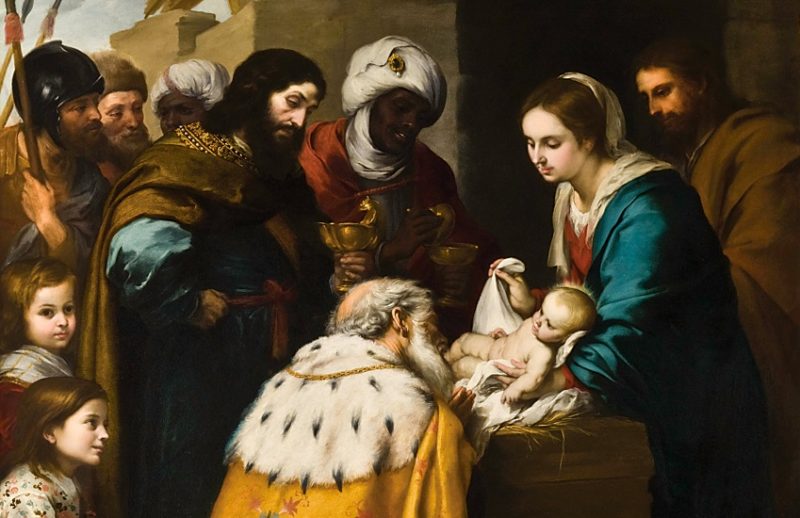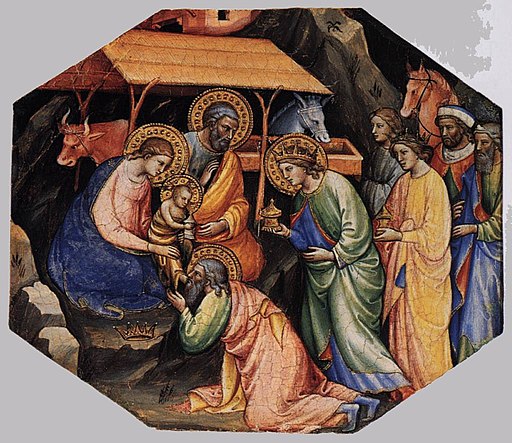On this day, the twelfth day of Christmas and the Feast of Our Lord’s Epiphany, Holy Church commemorates our Savior’s first manifestation of Himself to mankind, in the persons of the Wise Men from the East.
Two other great revelations of Our Lord’s divinity are also recalled in today’s feast (namely His Baptism, when the Holy Ghost descended upon Him and the voice of God the Father was heard declaring Jesus to be His beloved Son, and the wedding in Cana, when through His first miracle Our Lord revealed His divinity to His disciples), but these events are more especially commemorated on January 13 (the octave of today’s feast).
Glory to Thee, O Christ!
The Feast of the Epiphany
by Fr. Francis Xavier Weninger, S.J.
“We have seen His star, and are come to adore Him.” (Mat. 2: 2)
The festival of the Epiphany, also called the Feast of the Holy Three Kings, is one of the most ancient feasts of the Church of God; and from the very earliest ages was celebrated with special rejoicing by the children of the Catholic Church. We find the cause for this in the fact that this feast is associated with the remembrance of the greatest graces in which the faithful in every nation of the earth rejoice – namely, their call to the only saving faith, the holy Catholic Church.
We learn from sacred history that in the early days of Christianity this feast was celebrated with greater solemnity even than Christmas; for as the Church exclaims in her joy on Holy Saturday: “Of what use would it be for us to be born if we had not been made partakers of the benefits of redemption?” So might we cry out: “Of what use to us would it be to possess all the goods and pleasures of the world, if the grace of being called to the true Faith had not been granted to us through the mercy of God?”
The three kings with their attendants, prostrate at the feet of the Infant Jesus, were the firstlings of the heathens who acknowledged Jesus, and entered His Church. As we reflect upon the great happiness vouchsafed to them, the question forces itself upon us: “Why do not all nations likewise enjoy a participation in their happiness?” My answer is: “Because they do not look upward with the same love of truth to the star of the Magi”; and this, as I understand it, I will explain today.
Christ, before whom the three Magi knelt, calls Himself the King of Truth. He calls His kingdom, the Church, a kingdom of truth; consequently, whosoever will enter His kingdom, and find salvation therein must love truth and seek it; then he will find it, follow it, and through its influence attain salvation. It was thus that the hearts of the Magi were disposed; therefore they learned to know Jesus and the truth contained in His Church, to live in her spirit, propagate the kingdom of Christ, and at last to enter the realm of His glory.
They saw the star, knew its signification, and followed it. Why? They loved truth. Had not this been the case, the annunciation of the birth of our Savior through the star would not have excited so much interest in them. Had they not loved truth more than the goods and pleasures of this world, which, as crowned heads, they possessed in abundance, they would not have undertaken, at the cost of so much self-sacrifice, to seek for Christ. But they were more interested in obtaining the truth of salvation, in beholding the coming Teacher of nations, in learning to honor and adore Him, than in all the treasures of the world. Their resolution to search for Him was sublimely heroic.
If their eagerness for knowledge of heavenly things had not existed to so great a degree in their hearts, they might have thought within themselves: “It is well that He is born; He will surely arrange to come to us to teach us, or He will send someone else in His place. Besides, He is still a child, and cannot converse with us; wherefore, then, should we undertake a journey connected with so many difficulties?” All these circumstances, however, were of no weight with the three Magi, in whom eager desire and ardent love overpowered all other considerations, and they entered upon their journey.
The three sages searched for truth with assiduity and fearlessness. “Where is He who is to be born the King of the Jews?” Thus they inquired, full of confidence that their search would be rewarded, let the population of Jerusalem think what they would; let them mock and ridicule; did they but know the name of the place where the Messiah was to be born, according to the declaration of the prophets, they would find the way thereto, even if they could gain no companions for the journey, which it would seem was eventually the case, as they left Jerusalem alone.
The star again appeared, and remained over the place wherein Mary abode with the Child. They fall down before the divine Infant, and oh! with what joyful sentiments of adoration, love, and gratitude do they offer Him their homage! But, on the other hand, how graciously did the new-born Babe bless them, and replenish their hearts with the power and unction of His grace; how did it strengthen them in their resolution to follow His inspirations, to live and die for Him, and to spread His kingdom among their people all over the earth!
The three Magi searched for the truth, found it, and – obedient to the admonition of an angel – returned by another road to their respective homes, thus to escape the snares of Herod and to fulfill the will of God. It was thus, that these first fruits of faith in countries over which the dark cloud of heathenism still rested, gave the example unto all the children of men, how to know Christ and to enter Heaven. And what is the reason that, up to this time, this was not done in such a manner as the mercy of God intended, for the evils of all mankind?
I answer by the assertion that love for truth is, in general, rare among men. They love darkness better than light. They delight in their delusion, which flatters them, more than would the truth; for the truth points to the exercise of duty, teaches the spirit of Christian self-denial and contempt of human consideration, united with that fidelity which assures for us perseverance unto the end.
The Gospel for today affirms that Herod, and with him all Jerusalem, was terrified at the message of the three Magi, that the Savior, the King and Deliverer of the human race, was born. Herod was afraid, and trembled lest he should lose his throne. The Scribes and Pharisees also, those whitened sepulchers of evil, as Christ called them, instead of rejoicing, were filled with alarm; for they felt, and truly, that the promised Messiah would penetrate their interior, and censure their hypocrisy and malice.
The people – like the generality of men of all ages – principally imitated those who had the power to govern or command them, and they were accustomed to yielding to the stronger will of men whose knowledge was superior to their own. They also felt disappointed, because they expected an earthly Messiah, who would elevate them to be the mightiest nation in the world, and endow them with all temporal advantages, riches, and pleasures. Yet now they hear He has entered this world without His advent being perceived, and, whilst the Scribes remain in entire ignorance of His birth, men in the East are said to have seen His star, which nevertheless was not beheld by a single person in Jerusalem.
Love for truth was lacking in those who thus expressed themselves, and, therefore, they remained incredulous and indifferent, and did not even trouble themselves so far as to guide or direct the Magi to the vicinity of Bethlehem; nay, they probably regarded them as visionaries and dreamers.
Behold here, as in a mirror, the character of the infidel, especially of those who, with premeditation, become infidels – who, although born of Catholic parents, and brought up in the Church of God, later on play the infidel and pretend to waver in faith.
Such do not love truth, but the desire of their hearts is to find out what might make them rich and happy in this world. As regards their duties towards God – that is, with respect to religion – the generality of men are satisfied to live and die in that belief in which they were born, and do not inquire whether their religion is really the true religion.
Yes, a great portion, particularly of the so-called learned men, are afraid to recognize the truth, that they may not feel urged to confess and live according to its precepts. And since they know that the word of truth condemns their sinful actions, and threatens them with terrible chastisements from God, they hate it, and wish that they could totally extirpate the kingdom of Christ on earth. If they at times arrive at the conviction that all their endeavors in this regard are fruitless – and if, at certain times, the voice of conscience whispers loudly that the threatenings of the Lord might one day be verified in them on account of their infidelity – then, in secret, like Herod, they tremble, and a fear, which for the time cannot be stilled, fastens upon their souls.
Certainly they endeavor to appear, with all this, entirely different from what they are, and, therefore, become hypocrites, as Herod was. They assume the appearance of respecting God and His commands, Christ and His doctrines, but their actions do not correspond with their demeanor, for they persecute the Church with the direct intention to destroy her. Thereat they are filled with the suspicion which terrified the heart of Herod, that the Church would be dangerous to their plans. This is especially the case with rulers of the present day and with infidel politicians. They think to conquer by their cunning, just as Herod thought, but God’s providence brings them to disgrace. I point especially to one propensity in the character of Herod, a fit type of this worthy class. He became a tyrant, and committed infanticide.
This also resembles, especially in our days, the conduct of the enemies of the truths of faith. Such men, if they succeed in grasping the reins of government, proceed to persecution, and as they are endowed with an evil prudence, they recognize that nothing can promote their ideas better than to pervert the Catholic youth to their dangerous ideas, and seek to destroy in their hearts the life of holy faith. Therefore their solicitude to impede the influence of the Church in the education of youth, with which that infanticide, of which Herod was guilty, is not to be compared.
Herod benefited the souls of the Holy Innocents against their will, whilst the Herods in our days corrupt the youth and destroy their souls. What crime! Therefore, children of the Church, thank God for your call to the only true Church – to the holy Faith! Like the Magi, love the truth with all sincerity of heart. This disposition of heart is a pledge of victory over Lucifer, the “liar from the beginning.” Hold everywhere and always to this maxim of life: “Defend truth, and it will defend you and save you through Jesus Christ, the incarnate Truth.” Amen!





